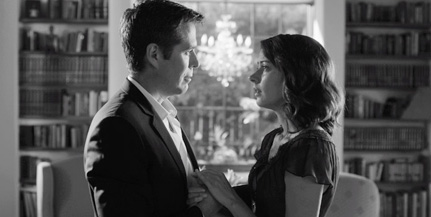The 400-Word Review: Much Ado About Nothing
By Sean Collier
June 24, 2013
When mounting Shakespeare on the stage, one of the most vital decisions to make involves the time and place. Should Macbeth conquer Scotland, or shall we transplant him to modern-day Wall Street? Will Hamlet mope and scheme in Denmark or be reimagined in feudal Japan? It’s a great way to keep Shakespeare’s works fresh and varied centuries later.
On the screen, though...play ’em where they lie. In a theater, seeing a Shakespearean work transformed can be refreshing; on the screen, it’s distracting. Case in point: Joss Whedon’s otherwise fine Much Ado About Nothing.
The A-list director filmed the comedy while still mired in the production process for The Avengers, about as starkly different a work as you can conceive; it’s clear that he had a grand time doing so. While “film director” is the sort of gig that generally requires you to change out of your pajamas, Whedon had no such compulsions here: Much Ado was filmed in his own Santa Monica home.
Being that very few chic California houses resemble the Sicilian estates of the 1500s, Whedon’s Much Ado is set today, pitting Shakespeare’s English against security cameras and cell phones. Some are enchanted by decisions like this; I’m annoyed by them.
Fortunately, there are few other complaints to levy. A crew of Whedon regulars owns the language, most notably Amy Acker’s turn as Beatrice and Fran Kranz’s as Claudio; Nathan Fillion is memorable as Dogberry, and Clark Gregg handles Leonato well. Some of the chemistry is lacking, but the characters are fully created.
Whedon is skilled in physical comedy and ensemble scenes — which are the meat and potatoes of Much Ado About Nothing — so he’s the right guy to direct, all else aside. And while the modern setting is off-putting, a modern soundtrack actually does capture the feeling Whedon is in pursuit of.
The only problem, then, is that damn setting, and it’s a big one. In one of Shakespeare’s scenes, Don Pedro and crew listen to a song by the overly humble bard Balthasar; in Whedon’s version, Pedro asks “Shall we hear this music?” and activates Balthasar’s modern equivalent — an iPod dock.
And that’s why this is a stupid idea.
Whether or not you agree with that assessment will determine how much you enjoy Whedon’s film. There’s plenty to enjoy. Unfortunately, a distraction this big can drown out a lot of good work.
BFCA Score: 7
Sean Collier is the Associate Editor of Pittsburgh Magazine and a member of the Broadcast Film Critics Association. Read more from Sean at pittsburghmagazine.com/afterdark




